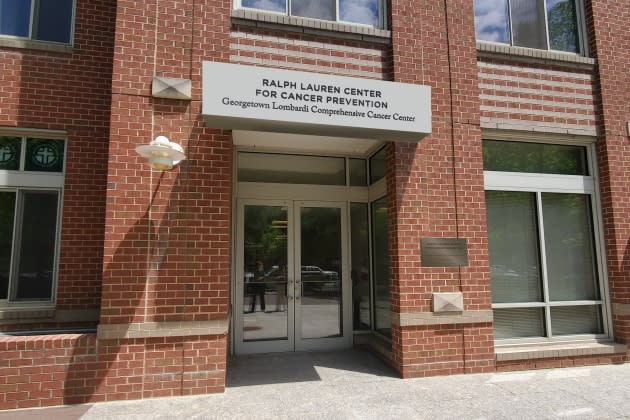Ralph Lauren Center for Cancer Prevention to Open at Georgetown Lombardi Comprehensive Cancer Center

The Ralph Lauren Center for Cancer Prevention at Georgetown Lombardi Comprehensive Cancer Center will open April 17, furthering the global fashion company’s decades-long commitment to cancer care and prevention.
As reported last year, The Ralph Lauren Corporate Foundation made a $25 million commitment in new grant funding to expand or establish five Ralph Lauren-named cancer centers in underserved communities across the U.S.
More from WWD
“More than 30 years ago, I made a personal, unwavering commitment to contribute to the fight against cancer,” said Ralph Lauren, executive chairman and chief creative officer of Ralph Lauren Corp. and chair of The Ralph Lauren Corporate Foundation. “Through The Ralph Lauren Corporate Foundation’s investment in Georgetown Lombardi, our hope is that our work together will help to reduce health disparities in underserved communities by creating improved access to the preventative care so critical for successful treatment and survival. And most of all, make a meaningful difference in the quality of life for those most vulnerable and in need.”
The Georgetown center, located at 1010 New Jersey Avenue, SE, Washington, D.C., builds on a longstanding partnership between Georgetown and Ralph Lauren on cancer research and care. A part of Georgetown University’s Lombardi Comprehensive Cancer Center, the facility, located in Ward 8, will focus on reducing disparities in health care affecting the city’s underserved communities through patient navigation — or individualized healthcare guides — community educators.
The new center is targeted at helping residents get the cancer care they need by bringing comprehensive cancer resources to underserved communities in southeast Washington (Wards 6, 7 and 8), where they have been historically lacking.
To celebrate the opening, Georgetown University and its president John J. DeGioia will host a ribbon-cutting ceremony onsite on April 17 with a special dedication to patients, staff and dignitaries. Executives from Ralph Lauren also will attend.
Services at the newly remodeled facility build on the programming and impact of the previous practices of the Capital Breast Care Center (CBCC) to expand beyond the breast cancer-focused services offered at the site, which has been operating for 15 years. The new center will now offer comprehensive cancer resources to the diverse populations disproportionately impacted by lung, colorectal, prostate and other cancers, from screening to treatment, when necessary. The center will also include a wider array of cancer-focused services, targeted outreach and education in collaboration with MedStar Health, Georgetown’s academic health system partner.
The center will support early detection as well as diagnostic and preventative measures and, when necessary, connect individuals to MedStar health for specialized care or to participate in clinical trials. The center will also provide community outreach, engagement and educational programming to residents east of the Anacostia River (Wards 6, 7 and 8).
“We’ve been working at this location and in this community with breast cancer patients for 15 years and what we know from that work and those relationships — along with research — is that addressing cancer disparities in communities and meeting people where they are makes a real difference,” said Lucile Adams-Campbell, Ph.D., director of the Ralph Lauren Center for Cancer Prevention at Georgetown Lombardi Comprehensive Cancer Center and associate director for minority health and health disparities at Georgetown Lombardi. “We are extremely excited to have the opportunity to now expand our focus on breast cancer to address colorectal, lung and prostate cancers because when we work directly with and in communities most impacted, we see dramatic improvements in early detection, diagnostic, treatment and preventive measures.”

Ralph Lauren has a longstanding history of support and partnership with Georgetown Lombardi. In 1989, Lauren, alongside Katharine Graham, cofounded the Nina Hyde Center for Breast Cancer Research at Georgetown Lombardi in honor of his close friend and former fashion editor of The Washington Post Nina Hyde. Over the years, the Ralph Lauren Corp. and the Ralph Lauren Corporate Foundation have focused a pillar of their philanthropic efforts on giving to cancer care and prevention causes and organizations.
Recognized by the White House’s Cancer Moonshot initiative, Lauren’s $25 million commitment will also benefit the Memorial Sloan Kettering Ralph Lauren Center in Harlem, New York. Both Georgetown Lombardi and Memorial Sloan Kettering Ralph Lauren Center in Harlem have a National Cancer Institute designation and are dedicated to overcoming health disparities and improving cancer outcomes in their communities. In the coming years, The Ralph Lauren Corporate Foundation will identify and select three additional grant recipients, who also have a National Cancer Institute designation, in collaboration with Conquer Cancer, the ASCO Foundation.
The majority of health care facilities in Washington, D.C., are located in the Northwest quadrant, making them unevenly distributed throughout the city. As many as 41 percent of residents across the nation’s capital aren’t receiving necessary cancer screenings, and health disparities between Black and white patients here are wider than they are in the rest of the country. Ward 8 is one of the most deeply impacted communities by these disparities with high cancer rates and lower life expectancies than populations in other parts of the district.
Patient navigators play a significant role in educating communities about cancer and helping patients overcome barriers to care and access. Research shows that patient navigators help reduce cancer disparities by guiding patients through the healthcare system. Patient navigators and other community-focused educators have been proven to help eliminate cancer disparities from diagnosis through treatment by assisting patients with lack of transportation, child or elder care, language barriers, medical mistrust, fear of what a screening, test or diagnosis will mean, and logistics navigating doctors and appointments amid many other life responsibilities.
Best of WWD

